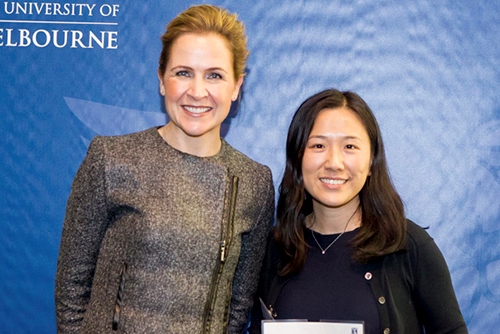The expansion of competition law
Asia is embracing competition law, and a Melbourne Law School PhD graduate is at the forefront of research and training in its rise into legislation across the continent.

Dr Wendy Ng with one of her supervisors, Professor Caron Beaton-Wells
Recently awarded the Harold Luntz Graduate Research Thesis Prize for her research into the political economy of China's competition law, Dr Wendy Ng (LLB (Hons)/BCom 2004) has been assisting the Australian Competition and Consumer Commission run workshops on competition law in Laos, Myanmar and Cambodia as part of the ACCC's capacity-building efforts in the ASEAN region.
The three countries are currently drafting competition laws that are expected to be adopted later this year. Dr Ng says the ACCC offers regulator-to-regulator advice and assistance on competition law, and raises awareness of the challenges involved in the implementation of competition law.
Dr Ng currently teaches at the University of Adelaide, having previously been a Teaching Fellow at MLS, where she taught corporate and competition law. "I am interested in understanding how the broader institutional, economic and political environment shapes laws, and my particular interest is competition law. When I first started my PhD, China had recently adopted its competition law. Because of the legal and political structures in China, it makes enforcement a much more complicated matter than what appears on the books," she says.
"This is what makes competition law in China so incredibly interesting and frustratingly complex."
The award Dr Ng received for her thesis at the MLS Awards Ceremony last month, she says, is an added bonus. "You toil away at your desk for a few years never knowing who might read your thesis beyond the examiners and your supervisors, and whether your research will have any practical relevance. Receiving this recognition that those years of hard work, both mine and of my supervisors, has been justified is wonderful."
Setting aside her previous career as a solicitor, Dr Ng says she is enjoying life as an academic. "Being an academic is more than teaching and the time spent in lectures and seminars – you can undertake research that truly interests you, and may even work with governments and international organisations to effect change. The variety and flexibility that being an academic offers will keep me engaged and busy for a very long time," she says.
"I will keep looking at Chinese competition and issues related to competition law and development, especially in Asia."
By Andy Walsh